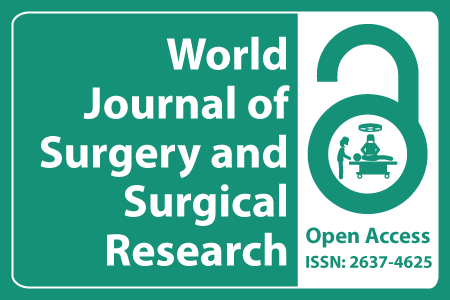
Journal Basic Info
- Impact Factor: 1.989**
- H-Index: 6
- ISSN: 2637-4625
- DOI: 10.25107/2637-4625
Major Scope
- Breast Surgery
- Hand Surgery
- Ophthalmology & Eye Surgery
- Pediatric Surgery
- Hepatology
- Plastic Surgery
- Surgical Oncology
- Endocrine Surgery
Abstract
Citation: World J Surg Surg Res. 2021;4(1):1291.DOI: 10.25107/2637-4625.1291
Patient Selection for Biodegradable Subacromial Spacer Implantation
Benjamin Marjanovic1*, Jakob Merkac1 and Peter Juvan1,2
1Department of Surgery, Orthopaedic Hospital of Valdoltra, Slovenia
2Department of Medicine, University of Ljubljana, Slovenia
*Correspondance to: Benjamin Marjanovic
PDF Full Text Research Article | Open Access
Abstract:
Objectives: This study reports on cases of implanted biodegradable subacromial spacer (InSpace
Balloon) in irreparable rotator cuff tears and aims to give guidelines for patient selection for
implantation of subacromial spacer. We measured GH distance, range and strength of abduction and
VAS, TCS and ASES scores of 29 patients before a surgery and after the implantation of subacromial
spacer. History of previous shoulder surgeries (first vs. revision), condition of subscapularis (intact
or irreparable vs. reparable) and condition of Long Head of the Biceps tendon (LHB), (tenotomy
vs. tenodesis, previous tenotomy or rupture), and the need for subacromial decompression during
surgery (yes vs. no) are considered in a sex-specific manner. Inferential statistics exposed factors
that significantly influence the outcome of an operation. Additionally, we discuss radiologically and
intraoperatively assessed condition of GH and AC arthrosis and the size of implanted balloon.
Patients: Our study included 29 patients (17 males, 12 females) that were treated in Orthopedic
Hospital of Valdoltra (Slovenia) between January 2016 and October 2017. In all patients, we
implanted biodegradable subacromial spacer (InSpace Balloon).
Methods: Statistical analysis was performed in R using WRS2 package [Mair, P., and Wilcox, R (2018).
WRS2: Wilcox robust estimation and testing] for robust inferential statistics with no assumption of
normality and homoscedasticity. The outcome of a surgery was assessed by GH distance, abduction
range and strength, and VAS, TCS and ASES scores before and after implementation of a subacromial
spacer.
Results: Abduction range of motion, strength, VAS, TCS and ASES scores showed significant
differences in their values before and after the surgery. GH distance decreased from 8.6 before to
8.1 after the surgery, but the difference was not significant. Patients were further split into groups
with respect to their gender and factors that we hypothesized to be influential on the outcome of
the surgery. Condition of subscapularis tendon, history of previous shoulder surgeries and the need
for subacromial decompression during surgery showed significant influence on the outcome of a
surgery; on the other hand, data does not provide support for the influence of the condition of
subscapularis tendon.
Conclusion: Implantation of subacromial spacer is a safe and effective method for treatment of
irreparable rotator cuff tears. Condition of subscapularis tendon, history of previous shoulder
surgeries and the need for subacromial decompression should be considered before the surgery
in a sex-specific manner as they significantly influence the outcome of the surgery with respect
to various criteria. These factors could potentially be used to predict the outcome of the surgery,
provide guidelines and implement a decision support system for patient selection for implantation
of subacromial spacer. Overall, implantation of subacromial spacer in irreparable rotator cuff tears
showed very good results with high patient satisfaction and pain relief.
Keywords:
Irreparable rotator cuff tear; Subacromial spacer; RC; CS
Cite the Article:
Marjanovic B, Merkac J, Juvan P. Patient Selection for Biodegradable Subacromial Spacer Implantation. World J Surg Surgical Res. 2021; 4:1291..













